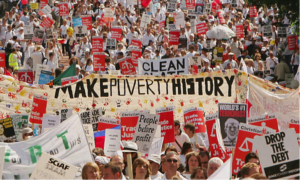
McLeod Group blog, December 4, 2017
When the Liberal government announced in June of this year that there would be an additional $62 billion over the next two decades for defence, but no additional funds for the much trumpeted Feminist International Assistance Policy, response was muted. There were several articles in the media, international development organizations expressed disappointment (again), but little response from the broader public. In short, there seemed to be no political cost to maintaining the aid program at its current low level, contrary to current global agreements.
The case for development cooperation (of which foreign aid is a part) is clear. It responds to both Canadian values and Canadian interests. It is a critical part of foreign policy that allows Canada to participate with other nations in addressing the root causes of many of the key global challenges identified in Foreign Minister Chrystia Freeland’s June speech – climate change, civil war, poverty, drought and natural disasters, and mass migrations. Globally, we will not meet the UN goal of ending extreme poverty by 2030 unless more concerted action is taken.
So why is Canadian international aid close to an all-time low? Is it that, as the old political adage says, there are no votes in foreign aid?
Recent polls confirm what has been true for many years. Canadians support the Canadian international aid program. They think that supporting health care, education, sanitation, and addressing other poverty-related issues are the right thing to do and they are proud of Canada’s commitment.
However, they have little understanding of what Canada actually does and in many cases overestimate Canada’s contribution. Not many could tell you that Canada is one of the least generous of OECD countries. They are not aware that much of the aid program has gone to support Canada’s commercial and political interests rather than addressing poverty. Few would talk about the need for policy coherence for development and the need to implement trade, defence, diplomatic and security policies in ways that are pro-poor and support an effective development program.
In fact, there is a strong charitable orientation to much of Canadians’ understanding of development. This is largely created and reinforced by fundraising and communication methods used by Canadian development organizations. These organizations face a dilemma. Fundraising research demonstrates that potential donors respond to emotional appeals, to personal stories and simple solutions.
Messages and images that raise money often reinforce stereotypes about “us and them” and about how “you can make a difference” by donating small amounts of money, notably by sponsoring a single child. Whereas approaches which seek to help people understand the roots of conflict, poverty, human rights abuses and promote messages of common interest, responsibility and solidarity appeal to a different part of the brain – and don’t raise as much money.
Although Canadians broadly support aid they do not often take to the streets to call for more money for aid, nor is aid top of their mind at election time (a fact not lost on politicians). This lack of action is partly because the development community in Canada – civil society organizations, universities, aid contractors, churches – has not often organized large public campaigns in support of more and better aid.
One exception to this was the 2005 Make Poverty History Campaign, which engaged millions of people in Canada and 40 other countries around four goals: more and better aid for developing countries, debt cancellation, trade justice, and ending child poverty domestically. It was one of the largest and most effective campaigns undertaken in support of development assistance. Although there were also critiques of some of the strategies, many lessons were identified in the evaluations, such as the importance of mass-market popular communications with a range of communications materials.
Then the 2006 election brought the Conservatives to power – and they began efforts to systematically undermine civil society organizations’ ability to advocate for causes related to their mission. After a few years, they began to cut the aid budget.
So two major challenges to the broad development community are to develop programs that help Canadians deepen their understanding of development cooperation and to support actions to lobby MPs effectively for more and better aid. The two probably need different strategies and approaches. In the short term, organizations could help by reviewing their communication and fundraising strategies to ensure they do not promote simplistic and self-serving messages. The Canadian government and especially Global Affairs Canada should also be more proactive in educating Canadians about the benefits of development cooperation.
Stay tuned. We hear that the Canadian Council for International Co-operation (CCIC) will be launching a major campaign in 2018 to help create the conditions for Canada to get back on track towards reaching 0.7% of gross national income. It will be interesting to see how the CCIC campaign tackles these communication challenges.
Photo: Make Poverty History protest march in Edinburgh, July 2, 2005.
